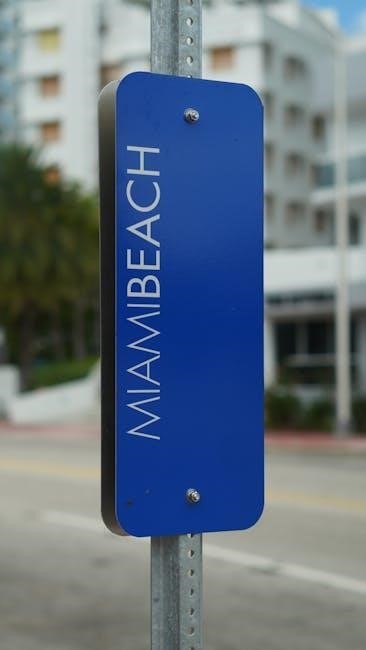manual cdl en español florida 2023
The Florida CDL Manual 2023 in Spanish is a comprehensive guide designed for Spanish-speaking applicants seeking a Commercial Driver License in Florida․ It provides bilingual resources, safety regulations, and detailed instructions for the licensing process, ensuring accessibility and understanding for all drivers․
Overview of the CDL Program in Florida
The Florida CDL Program ensures drivers meet federal and state standards for operating commercial vehicles safely․ It outlines licensing requirements, training protocols, and testing procedures․ The program covers Class A, B, and C licenses, endorsements, and restrictions․ Applicants must pass written knowledge and skill tests, meet medical certification, and comply with vision standards․ The FLHSMV provides resources, including the Spanish manual, to guide applicants through the process․ The program emphasizes road safety, emergency protocols, and professional driving practices, preparing drivers for real-world scenarios and maintaining public trust in commercial transportation․
Importance of the Spanish-Language CDL Manual
The Spanish-language CDL manual is essential for Spanish-speaking applicants, providing clear, accessible information to navigate Florida’s licensing process․ It ensures understanding of safety regulations, driving laws, and testing requirements, reducing language barriers․ The manual covers state and federal standards, medical certifications, and endorsement details, enabling applicants to prepare effectively․ By offering key sections in Spanish, it promotes inclusivity and supports drivers in achieving their CDL, fostering safer roads and professional growth for all Floridian drivers, regardless of language proficiency․
Eligibility Criteria for Obtaining a CDL in Florida
Florida requires CDL applicants to meet specific eligibility criteria, including age, residency, medical certification, and necessary documentation․ These standards ensure compliance with state and federal regulations․
Age Requirements
To apply for a CDL in Florida, you must meet specific age requirements․ For interstate commerce, you must be at least 21 years old․ For intrastate commerce, the minimum age is 18 years old․ However, individuals under 21 cannot operate a commercial vehicle across state lines․ Additionally, certain exceptions apply for farm-related licenses, such as the Farm Husbandry Permit, which allows limited operation of farm vehicles at a younger age․ These age requirements ensure compliance with federal and state regulations, promoting safety on the roads․
Residency and Documentation
In Florida, CDL applicants must provide proof of residency and identity․ Required documents include a valid Social Security card, birth certificate, or passport, and two proofs of Florida residency, such as a utility bill or lease agreement․ Non-citizens must provide valid immigration documents․ These requirements ensure eligibility and compliance with state and federal laws․ Proper documentation is essential for processing the CDL application efficiently and verifying the applicant’s legal status to operate a commercial vehicle in Florida․
Medical Certification
Medical certification is a mandatory step for CDL applicants in Florida․ Drivers must undergo a Department of Transportation (DOT) physical exam by an FMCSA-certified medical examiner․ The exam evaluates vision, blood pressure, and overall health to ensure fitness for operating commercial vehicles․ Applicants must provide the Medical Examiner’s Certificate (MEC) as proof of compliance․ Vision standards require at least 20/40 acuity in each eye with or without correction․ Certain medical conditions may disqualify applicants․ The certification is valid for up to two years, depending on health status, and must be renewed to maintain CDL validity․
Application Process for a CDL in Florida
The CDL application process in Florida involves submitting required documents, paying fees, and passing medical exams․ Applicants must schedule tests and complete all steps as guided by the FLHSMV․
Step-by-Step Guide to Applying
The process begins with selecting the appropriate CDL class and endorsements based on the type of vehicle you intend to operate․ Gather all required documents, including proof of residency, identity, and medical certification․ Complete and pass the mandatory medical examination to ensure eligibility․ Submit your application and pay the associated fees at a local FLHSMV office․ Study the official CDL manual to prepare for the written knowledge test․ Once ready, schedule and pass the test to obtain a Commercial Learner’s Permit (CLP)․ After holding the CLP for the required period, schedule and pass the skills test to receive your CDL․
Required Documents
To apply for a CDL in Florida, you must provide specific documents․ These include proof of identity, such as a valid passport or birth certificate, and proof of residency, like a utility bill or lease agreement․ Additionally, you’ll need to submit your Social Security card or equivalent and complete a Medical Examiner’s Certificate․ All documents must be valid and original copies; Ensure you verify the exact requirements with the FLHSMV to avoid delays in the application process․
- Proof of identity
- Proof of residency
- Social Security documentation
- Medical certification
Fees and Payment Methods
Understanding the fees and payment methods is crucial for obtaining a CDL in Florida․ The application fee for a CDL is $75, with additional costs for endorsements and tests․ The following fees apply:
- Base application fee: $75
- Endorsement fee: $10 each
- Skill test fee: $50
- License fee: $48 for 6 years
Payment can be made via cash, credit card, or check․ Ensure to verify total costs and accepted payment methods with the FLHSMV before applying to avoid delays․

Understanding the CDL Manual
The Florida CDL Manual is a comprehensive guide detailing state-specific rules, safety practices, and licensing procedures․ It serves as a detailed resource for applicants preparing for the CDL process․
Structure and Content
The Florida CDL Manual 2023 in Spanish is organized into clear sections, covering essential topics like safety practices, traffic laws, and medical requirements․ It includes detailed chapters on obtaining a CDL, such as application steps, required documents, and fees․ The manual also emphasizes emergency procedures and vehicle inspection protocols․ Designed to be user-friendly, it provides a structured approach to understanding the licensing process, ensuring applicants are well-prepared for both written and skill tests․ Each section is tailored to address specific needs of Spanish-speaking drivers․
Key Sections for Spanish-Speaking Applicants
The manual emphasizes medical certification, vision standards, and emergency procedures, ensuring Spanish-speaking applicants understand critical safety protocols․ It highlights endorsements and restrictions, explaining requirements for operating special vehicles․ The section on license types (Class A, B, C) is particularly useful, providing clarity on vehicle classifications․ Additionally, it covers test preparation, including tips for written and skill tests, helping applicants feel confident and prepared for the CDL process in Florida․

Spanish-Language Resources for CDL Preparation
The Spanish-language resources include the official FLHSMV CDL manual, online guides, and practice tests tailored for Spanish-speaking applicants, ensuring comprehensive preparation for all CDL requirements in Florida․
Official Florida CDL Manual in Spanish
The Official Florida CDL Manual in Spanish is a comprehensive resource designed to assist Spanish-speaking applicants in preparing for the Commercial Driver License exams․ It includes detailed information on licensing requirements, safety regulations, and driving laws specific to Florida․ The manual is structured to provide clear guidance on vehicle operation, traffic rules, and medical certification processes․
Available online and in print, this manual ensures that Spanish-speaking drivers have access to the same accurate and up-to-date information as English-speaking applicants, promoting equality and safety on the road․
Additional Study Materials
Beyond the official manual, Spanish-speaking CDL applicants can access supplementary study materials to enhance their preparation․ These include online practice tests, interactive guides, and video tutorials that cover essential topics like road safety, vehicle inspection, and traffic laws․
Additional resources such as CDL prep apps and flashcards are also available, offering flexible learning options․ The Florida Department of Highway Safety and Motor Vehicles (FLHSMV) website provides links to these materials, ensuring applicants have everything needed to succeed․

CDL Training Programs in Florida
The Florida CDL training programs offer comprehensive courses through approved schools, emphasizing hands-on experience for Class A, B, and C licenses, preparing drivers for real-world challenges․
Approved Training Schools
Florida’s approved CDL training schools are certified by the FLHSMV and FMCSA, ensuring high-quality instruction․ These schools provide experienced instructors, hands-on training, and a mix of classroom and behind-the-wheel instruction․ They cover essential topics like safety practices, vehicle inspection, and federal regulations․ Many programs cater to Spanish-speaking students, offering bilingual materials․ The curriculum is designed to meet state and federal requirements, preparing students for both the written and skills tests․ Students should verify a school’s certification status with the FLHSMV before enrolling to ensure compliance and quality education․
School Bus Driver Training
School Bus Driver Training in Florida is a specialized program designed to prepare drivers for safely transporting students․ The curriculum includes emergency protocols, passenger management, and vehicle inspection procedures․ Training covers specific laws and safety regulations for school buses․ Applicants learn how to respond in crisis situations and handle challenging passenger behavior․ The program is comprehensive, ensuring drivers are well-equipped to operate safely and responsibly․ It is tailored for both new and experienced drivers, emphasizing the unique requirements of school bus operation․ The training is available in Spanish to accommodate diverse applicants․
General CDL Training Curriculum
The General CDL Training Curriculum in Florida covers essential topics to prepare drivers for commercial vehicle operation․ It includes sections on safety regulations, vehicle inspection procedures, and emergency response protocols․ Students learn about traffic laws, hazardous material handling, and safe driving practices․ The curriculum also emphasizes logbook management and hours of service rules․ Training programs combine classroom instruction with hands-on practice to ensure comprehensive understanding․ The Spanish-language manual aligns with this curriculum, providing clear guidance for Spanish-speaking applicants․ This structured approach ensures all drivers meet Florida’s CDL requirements effectively․

CDL Testing Process
The CDL testing process in Florida includes written knowledge tests, skill tests, and endorsements․ The Spanish-language manual ensures accessibility for Spanish-speaking applicants, covering all necessary procedures and requirements effectively․
Written Knowledge Tests
The written knowledge tests are a critical first step in obtaining a CDL in Florida․ These tests assess your understanding of traffic laws, safety protocols, and vehicle operation․ The Spanish-language manual provides clear instructions on test topics, ensuring accessibility for Spanish-speaking applicants․ Questions cover essential areas such as road signs, safe driving practices, and regulations specific to commercial vehicles․ Proper preparation using the manual is vital to achieve a passing score and progress in the licensing process․
Additionally, the tests may include sections on handling emergencies and special vehicle requirements․ Studying the manual thoroughly guarantees a strong foundation for success in the written exams and beyond․
Skill Tests
The skill tests are practical assessments of your ability to operate a commercial vehicle safely․ They include a pre-trip inspection, basic vehicle control, and on-road driving․ Applicants must demonstrate proficiency in inspecting the vehicle, maneuvering in tight spaces, and navigating various road conditions․ These tests are conducted in Spanish for language accessibility and ensure that drivers meet Florida’s safety standards․ Proper preparation through the Spanish manual and practice are essential to pass these evaluations successfully․
The skill tests evaluate your ability to handle real-world driving scenarios, ensuring you can operate a commercial vehicle competently and safely․
Endorsement and Restriction Explanations
Endorsements on a CDL indicate special permissions, such as hauling hazardous materials or operating school buses․ Restrictions limit driving privileges, like prohibiting manual transmission operation․ The Spanish manual explains these in detail, ensuring drivers understand requirements for endorsements like H (hazardous materials) or S (school buses)․ Restrictions, such as E (automatic transmission only), are also clarified to avoid license limitations․
Understanding endorsements and restrictions is crucial for compliance․ The manual guides applicants through specific requirements, helping them prepare for tests and maintain legal driving privileges in Florida․

Practice Tests and Study Guides
The Florida CDL Manual 2023 in Spanish offers official practice tests and study guides to help applicants prepare for exams․ These resources are designed to ensure a thorough understanding of the material, covering essential topics like road safety, traffic laws, and vehicle operation․
Online Resources
Spanish-speaking CDL applicants in Florida can access online resources, including the official Florida CDL Manual 2023 in Spanish, practice tests, and interactive study guides․ These tools, available on the FLHSMV website, provide comprehensive preparation materials, such as downloadable PDFs, video tutorials, and mobile-friendly platforms․ Additionally, third-party websites offer mock exams and detailed explanations to help applicants master the content․ These resources ensure that Spanish-speaking drivers can efficiently prepare for their exams and understand the requirements for obtaining a CDL in Florida․
Mock Tests
Spanish-speaking CDL applicants can utilize mock tests available online to simulate actual exam conditions․ These tests cover essential topics like road safety, traffic laws, and vehicle operation, helping applicants assess their readiness․ Many mock tests are designed to mirror the format of the official CDL exams, ensuring familiarity with the question types and content․ By practicing with these tools, applicants can identify weak areas, improve their knowledge, and build confidence before taking the real CDL exams․
Test-Taking Strategies
Spanish-speaking applicants can enhance their exam performance by employing effective test-taking strategies․ Skim through the Florida CDL Manual beforehand to familiarize yourself with the content․ Focus on understanding question types, such as multiple-choice and true/false, to manage your time efficiently․ Practice active reading by highlighting key points and reviewing them before the test․ Stay calm and read each question carefully to ensure comprehension․ Utilize elimination techniques to narrow down answers and avoid guessing․ These strategies will help build confidence and improve performance on the CDL exams․
Endorsements and Restrictions
Endorsements and restrictions modify CDL privileges based on driver qualifications and vehicle types․ Endorsements authorize special operations, while restrictions limit driving privileges to specific conditions or vehicles․
Types of Endorsements
CDL endorsements in Florida include H (hazardous materials), P (passenger vehicles), S (school buses), N (tank vehicles), and T (double/triple trailers)․ Each endorsement requires specific knowledge and skills․ For example, the H endorsement mandates a background check and knowledge of handling hazardous materials․ The S endorsement includes training in student transportation and emergency procedures․ Applicants must pass additional tests and meet federal and state requirements to obtain these endorsements, which expand career opportunities in specialized commercial driving roles․
Restrictions on CDL
Restrictions on a CDL in Florida are imposed to ensure public safety and may include medical or vision limitations․ Drivers with certain health conditions or poor vision may face restricted licenses․ Additionally, operating without proper endorsements or violating traffic laws can lead to penalties․ For example, a driver without a school bus endorsement cannot transport students․ These restrictions are enforced to prevent accidents and maintain road safety․ Understanding these limitations is crucial during the application process and for maintaining a valid CDL effectively․

License Types and Classifications
The Florida CDL Manual outlines Class A, Class B, and Class C licenses, each requiring specific vehicle operation qualifications․ The manual provides detailed information on each classification․
Class A, B, and C Licenses
The Florida CDL Manual explains the differences between Class A, Class B, and Class C licenses․ Class A allows operation of combination vehicles with a GVWR of 26,001 lbs or more․ Class B covers heavy straight trucks with a GVWR of 26,001 lbs or more․ Class C is for small passenger vehicles or HazMat vehicles requiring a CDL․ Each classification has specific operation requirements and restrictions․ The manual provides detailed explanations to help applicants determine the correct license for their career needs and ensure safe, compliant operation of commercial vehicles․
Endorsements for Special Vehicles
Endorsements for special vehicles are additional certifications required to operate specific types of commercial vehicles․ Common endorsements include H (hazardous materials), S (school buses), N (tank vehicles), and P (passenger vehicles)․ Each endorsement requires specific knowledge and skills, as outlined in the Florida CDL Manual․ Applicants must pass additional written and skill tests to obtain these endorsements․ The manual provides detailed instructions on how to apply for and maintain these endorsements, ensuring drivers are fully prepared to operate specialized vehicles safely and legally․

Safety and Driving Practices
Safe driving practices are crucial for commercial drivers․ Adherence to traffic laws, regular vehicle inspections, and defensive driving techniques are emphasized in the manual to ensure road safety․
Safe Driving Tips
Safe driving practices are essential for commercial drivers․ Maintain a safe distance, use mirrors regularly, and adhere to speed limits․ Be prepared for emergencies and know proper procedures․ Always keep an emergency kit and first aid supplies․ Avoid distractions while driving and stay alert․ Use brakes smoothly and never tailgate․ Familiarize yourself with vehicle safety features like ABS․ Regular vehicle inspections ensure roadworthiness․ Stay informed about weather conditions and adjust driving accordingly․ Continuous training and adherence to traffic laws enhance safety on the road․
Emergency Procedures
Emergency procedures are critical for commercial drivers․ In case of an accident, remain calm and ensure passenger safety․ Evacuate the vehicle if necessary and use fire extinguishers appropriately․ Secure the area with warning devices and notify authorities immediately․ Familiarize yourself with first aid basics and provide assistance if needed․ Keep emergency contact information accessible․ Regularly review emergency protocols to stay prepared․ Always follow proper procedures for incidents like fires, medical emergencies, or vehicle breakdowns․ Quick, correct actions can prevent injuries and reduce risks during critical situations․

Medical and Vision Requirements
All CDL applicants must meet medical certification and vision standards․ A DOT physical exam is required to ensure ability to operate commercial vehicles safely․ Visual acuity tests are mandatory․
Medical Certification Process
The medical certification process for CDL applicants in Florida involves a mandatory DOT physical exam conducted by an FMCSA-certified medical examiner․ Applicants must provide detailed medical history and undergo vision and physical assessments to ensure compliance with federal safety standards․ The exam focuses on conditions that could impair driving ability, such as poor vision, hearing loss, or chronic health issues․ A valid Medical Examiner’s Certificate is required to obtain or renew a CDL․ The FLHSMV maintains records of all medical certifications for compliance purposes․
Vision Standards
To obtain a CDL in Florida, applicants must meet specific vision standards․ The DOT physical exam includes a vision test to assess acuity and peripheral vision․ Corrected vision must be at least 20/40 in both eyes, and uncorrected vision must be at least 20/40 in each eye․ Monocular drivers may qualify under certain conditions if they can meet federal guidelines․ These standards ensure that drivers can operate vehicles safely and maintain road awareness․ Compliance with these vision requirements is mandatory for medical certification and license issuance․

Maintaining Your CDL
Regular renewal, updating personal information, and adhering to medical certifications are essential to keep your CDL valid․ Stay compliant with Florida’s requirements to maintain your license․
Renewal Process
The CDL renewal process in Florida typically occurs every 5 years․ Applicants must submit required documents, pay fees, and pass a vision test․ Medical certification is mandatory for certain endorsements․ Online, in-person, or mail-in renewal options are available․ Ensure all information is up-to-date, and renew before the expiration date to avoid penalties․ Additional documentation may be needed for non-citizens․ Check the FLHSMV website for specific requirements and forms․ Renewal ensures continued compliance with state and federal regulations for commercial drivers․
Keeping Your License Valid
To maintain a valid CDL in Florida, drivers must meet medical certification requirements, pass vision tests, and update their endorsements as needed․ Ensure all documentation, such as medical certificates, remains current․ Stay informed about any changes in state or federal regulations․ Regularly check the status of your license through the FLHSMV portal․ Avoid convictions or violations that could lead to suspension․ Properly notify the FLHSMV of any address changes․ Adhere to all safety and legal standards to keep your CDL in good standing and avoid penalties․
Obtaining a Florida CDL requires dedication and thorough preparation․ Review the Spanish manual, practice regularly, and stay updated on regulations․ Success starts with careful planning and consistent effort․
The Florida CDL Manual 2023 in Spanish is a bilingual guide offering detailed insights into obtaining a Commercial Driver License․ It covers safety regulations, licensing processes, and medical certifications․ The manual emphasizes eligibility criteria, application steps, and the importance of vision and medical standards․ Additionally, it outlines endorsement requirements and restrictions, providing resources for Spanish-speaking applicants․ By focusing on key areas like practice tests and official guides, the manual ensures comprehensive preparation for CDL exams, making it an essential tool for aspiring drivers․
Encouragement and Next Steps
Obtaining a CDL is a significant step toward a rewarding career in transportation․ Spanish-speaking applicants can confidently prepare using the Florida CDL Manual 2023 in Spanish, ensuring they meet all requirements․ After reviewing the manual, applicants should visit the FLHSMV website or consult approved training programs for further guidance․ Stay focused, practice consistently, and take the necessary steps to achieve your goal․ With dedication, you’ll be well-prepared to pass the exams and embark on this important journey․
Additional Resources
For further preparation, the Florida CDL Manual 2023 in Spanish directs applicants to the FLHSMV website and recommended study materials, ensuring comprehensive readiness for the CDL exams․
Florida Department of Highway Safety and Motor Vehicles (FLHSMV)
The FLHSMV is the official source for the Florida CDL Manual 2023 in Spanish, offering a comprehensive guide for Spanish-speaking applicants․ It provides detailed information on state-specific laws, safety practices, and the licensing process․ The manual is designed to help applicants prepare for CDL exams, covering essential topics like vehicle inspection, traffic rules, and emergency procedures․ Additionally, the FLHSMV website offers downloadable resources, practice tests, and a list of approved training schools to support applicants in obtaining their Commercial Driver License successfully․
Recommended Study Materials
Supplement your preparation with the 2023 Florida CDL Manual in Spanish and additional resources like online practice tests and study guides․ Utilize FLHSMV-approved materials, such as the Official CDL Handbook and Spanish-language practice exams, to ensure comprehensive understanding․ Many applicants also benefit from CDL prep apps and training programs offered by certified schools․ These tools enhance knowledge retention and familiarize applicants with the exam format, covering essential topics like safety protocols, vehicle inspections, and traffic laws specific to Florida․
